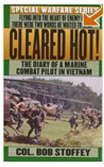A Hot War Diary From Coaldale Native
September 13, 1992|by FRANK WHELAN, The Morning Call
"Cleared Hot! A Marine Combat Pilot's Vietnam Diary" by Col. Bob Stoffey; St Martin Press; $21.95; 285 pp.
Nations have always needed soldiers like Col. Bob Stoffey. Since the days when Roman legionaires guarded the borders of a far-flung empire, tough, proud military men have been called on to perform the dirty jobs the rest of their society scorned. It was Stoffey's lot to be involved in one of the most confused pages in U.S. history, the Vietnam War. That he was also able to write a good, if partisan, book on the subject says a lot about the man's talents.
Stoffey, a native of Coaldale, Schuylkill County, grew up hearing tales of his father's service in World War I. He was a football  player at Coaldale High School from which he graduated in 1953. Stoffey went on to Pennsylvania State University and for a time worked as a tool-design engineer at Air Products when it was in Emmaus. Today he works as an integrated-circuits sales manager at Hughes, the computer and defense contractor in Newport Beach, Calif. Stoffey lives in nearby Carlsbad, Calif., with his wife, the former Eleanor R. Dedinsky of Lansford, Carbon County.
player at Coaldale High School from which he graduated in 1953. Stoffey went on to Pennsylvania State University and for a time worked as a tool-design engineer at Air Products when it was in Emmaus. Today he works as an integrated-circuits sales manager at Hughes, the computer and defense contractor in Newport Beach, Calif. Stoffey lives in nearby Carlsbad, Calif., with his wife, the former Eleanor R. Dedinsky of Lansford, Carbon County.
But for 25 years, from the late 1950s to 1979, Bob Stoffey was a Marine Corps combat pilot. He served during the 1962 Cuban missile crisis and three combat tours for four years in Vietnam. Stoffey first came to Da Nang, Vietnam, as a captain in 1965. At that point America still had a relatively limited role in the conflict.
Early on, Stoffey tells the base commander that he came to Vietnam to fly, not help build the new airfield the general wants. "Captain," the commander replies, "if those pussyfootin' congressmen back in Washington run this war like they did in Korea, instead of allowing the military to do their thing, we'll be down here for years -- and you'll have more flying than you really want."
The commander's prediction proved accurate. First in a helicopter and later as the pilot of low-flying Marine aircraft called an OV-10, Stoffey gets to see the combat side of the war fast. And life on the ground is not always peaceful either. Several times he mentions Viet Cong and North Vietnamese attacks on the base. More than once Stoffey had conversations in his tent interrupted by incoming fire.
As in all wars, there is the strange mixture of tragic and bizarre in Stoffey's Vietnam service. One of the oddest might be called the affair of the 700 light switches. After trying unsuccessfully to get this essential item for his base from the military, he goes to a Vietnamese woman merchant in Da Nang called Lily Ann. She promises to come up with them and does. But Stoffey is shocked to find the light switches that Lily Ann wants $4 apiece for are still in their U.S. government foreign-aid box with its red, white and blue shield and handclasp emblem.
When Stoffey protests, she reminds him that these were not an easy item to find. "Captain, I had to pay politician in Saigon. Had to pay warehouse manager to tell guard to look the other way. Does Vietnamese government control Highway 1? Do American troops control Highway 1 all the way from Saigon to Da Nang? No. VC control Highway 1 at three areas. Therefore, I must pay VC road taxes to have driver drive from Saigon to Da Nang with switches. You understand. And then Lily Ann must make a little profit, no?" An angry, frustrated Stoffey reluctantly agrees. "I needed those switches," he says.
Stoffey's combat descriptions are the best part of his book. Perhaps the most interesting is the night Stoffey sets his chopper down right in the middle of a blazing fight between U.S. Marines and the Viet Cong.
At the height of the battle, an explosion rocks a pagoda where VC are hiding. One guerrilla soldier comes charging out of the temple with his gun blazing and headed right for Stoffey. The VC was quickly cut down, but when a Marine threw the body on the copter, the craft shook so much Stoffey thought he'd been hit by a rocket-propelled grenade. This incident causes Stoffey to wonder briefly what sort of fanatical spirit moved this man. How could he give his life for a system that would bring tyranny to his people?
In the end, Stoffey left Vietnam angry, frustrated and bitter. He had seen his friends and comrades die and S
outh Vietnam destroyed and betrayed because, he feels, the military was forced to fight the war with one hand tied behind its back.
He blames Congress, the press, Jane Fonda, Tom Hayden and an uninformed public for the failure of America to fulfill its mission in Southeast Asia. One does not necessarily have to agree with Stoffey's political point of view to respect him for writing an interesting and moving account of the Vietnam War as he saw it.
Source: http://articles.mcall.com/1992-09-13/entertainment/2867309_1_vietnam-war-viet-cong-combat
Click here for more information and writings of Col. Bob Stoffey.

